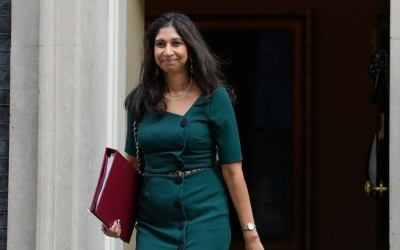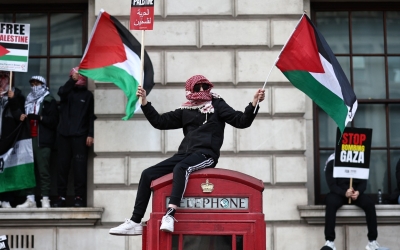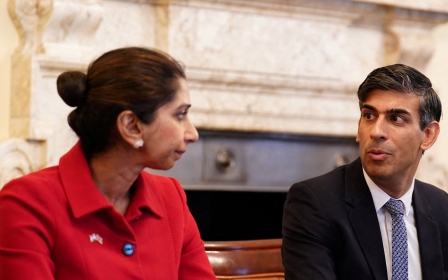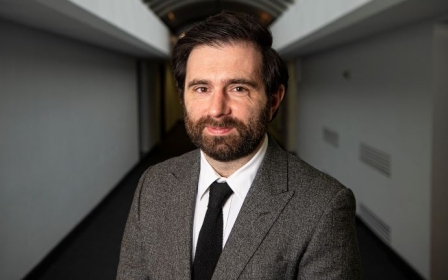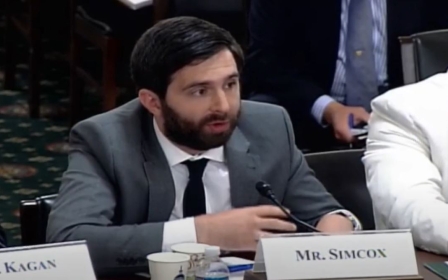Robin Simcox: A cheerleader for the UK government's own brand of extremism
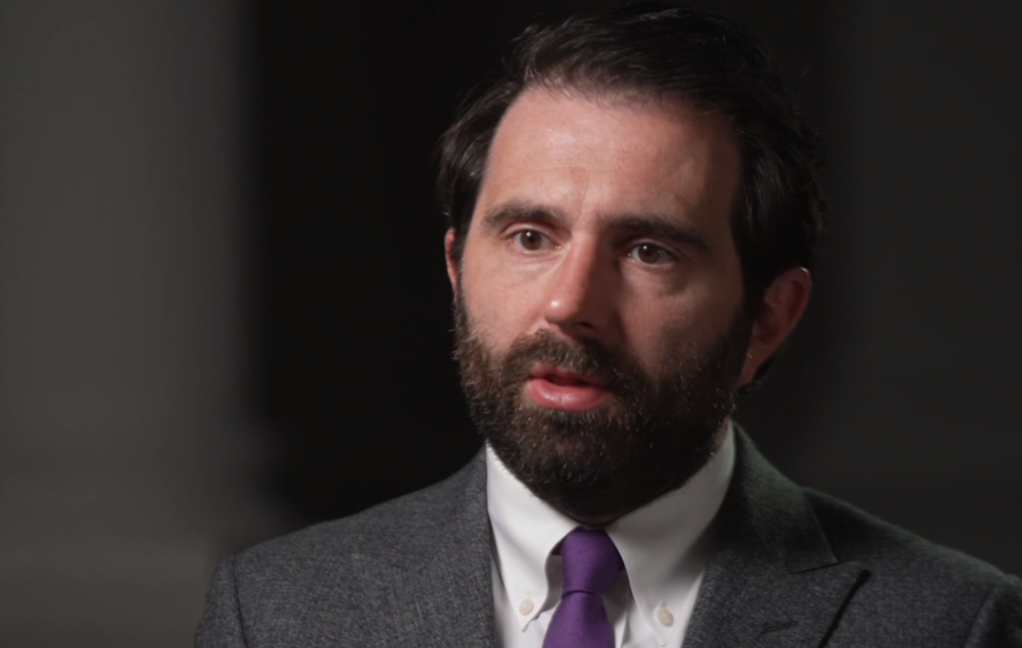
Robin Simcox, the UK’s commissioner for countering extremism, has been mostly content to keep a low profile since he was appointed to the role two years ago.
But on 19 October he made his first major public intervention by setting the terms of discourse for discussion of the Israel-Palestine War.
By all accounts it was a substantial intervention. Simcox slammed pro-Palestine protests. He called the UK a “permissive environment” for antisemitism. He warned of a Hamas support network in the country - and urged a crackdown on non-violent Islamism.
His remarks were made to the Royal United Services Institute (RUSI), a leading defence and security think tank, and were treated with near-deferential respect in the media.
His views appear to be largely in step with those of Home Secretary Suella Braverman and Communities Secretary Michael Gove, who are reported to have ordered a "crackdown on extremism" involving efforts to draw up a new definition of extremism, years after previous Conservative governments tried and failed to formulate a legally binding definition.
New MEE newsletter: Jerusalem Dispatch
Sign up to get the latest insights and analysis on Israel-Palestine, alongside Turkey Unpacked and other MEE newsletters
Braverman, who has previously been accused of using inflammatory language about migrants and refugees, has also been ramping up rhetoric against pro-Palestinian protesters over much of the past month.
In a letter to police chiefs, Braverman first urged them to consider whether waving a Palestinian flag or pro-Palestinian chants might be public order offences. Then she accused people taking part in pro-Palestinian demonstrations in London of participating in "hate marches".
On Monday, Braverman doubled down on that language as organisers of another pro-Palestine demonstration set to take place in London coinciding with Armistice Day this Saturday faced pressure to cancel the march.
"The hate marchers need to understand that decent British people have had enough of these displays of thuggish intimidation and extremism," Braverman wrote on X, the social media platform formerly known as Twitter.
Taken alongside similar comments by government ministers, Simcox’s speech appears to indicate that a revamped domestic "war on terror" is about to begin. This makes it all the more important that Simcox himself is held to account.
'Relentless Islamophobia'
In this article, we will argue that Simcox should not be regarded as a neutral arbiter of extremism – as might be expected in such a role - but rather as a partisan figure within the landscape over which he has been appointed to cast scrutiny.
We will examine Simcox’s links to right-wing networks accused of promoting Islamophobia in both British and American politics and media.
Simcox was initially appointed interim commissioner under Home Secretary Priti Patel in March 2021 and then confirmed in the role by Braverman in July 2022.
He had made a name for himself at two influential neoconservative think tanks on either side of the Atlantic, the Henry Jackson Society (HJS) in London and the Heritage Foundation in Washington.
Prior to that, from 2008 to 2011, Simcox worked at the Centre for Social Cohesion (CSC), a right-wing think tank which produced work focusing on counter-terrorism and Muslims.
Its director was Douglas Murray, who in a speech to the Dutch Parliament in 2006 had called for conditions for Muslims in Europe to be made “harder across the board”.
At the CSC, Simcox’s output included a report critical of foreign funding for British universities, which one critic described as “drawing peculiar conclusions that only really make sense in the context of the CSC's relentless Islamophobia”.
The think tank also campaigned against an Islamic school foundation which it falsely claimed was a front for the controversial organisation Hizb-ut-Tahrir (HT).
In 2011, the CSC was incorporated into the Henry Jackson Society. Simcox became a research fellow, with Murray as associate director.
Some of the most pointed criticism of the HJS has come from former insiders.
One of its founders, Matthew Jamison, denounced it as a “monstrous animal” and a “deeply anti-Muslim racist organisation”.
Another former member, Marko Atilla Hoare, described it as having become “an abrasively right-wing forum with an anti-Muslim tinge, churning out polemical and superficial pieces by aspiring journalists and pundits”.
In 2016, Simcox crossed the Atlantic to take up a new role as Margaret Thatcher Fellow at the Heritage Foundation.
The main role of the CCE today appears to be cheerleading and rubber-stamping Home Office policy and providing a veneer of pseudo-independent oversight
The Heritage Foundation is a right-wing think tank considered so important to the Trump administration that the New York Times described it in 2018 as “stocking Trump’s government” with its staff.
Some of the work Simcox carried out there anticipated his later approach as commissioner for countering extremism.
In 2017 he produced a report encouraging the Trump administration to investigate the Muslim Brotherhood in the US, identifying non-violent Islamism as an ideological threat.
In 2019, Simcox took part in an event discussing the apparent links between refugees and terrorism hosted by the Centre for Immigration Studies (CIS).
Nafeez Ahmed has written for Byline Times about how the CIS was founded by eugenicist John Tanton and has promoted explicitly antisemitic, anti-Muslim and white supremacist ideas.
Writing for the Heritage Foundation that year, Simcox described the term Islamophobia as a “slippery concept” used to “shut down criticism” of Islam.
He told the government to be “wary” of calls for an internal Conservative Party review into Islamophobia, and called for the Muslim Council of Britain (MCB), the largest body claiming to represent British Muslims, to be “left out in the cold”.
Simcox, Shawcross and Prevent
Simcox’s past at right-wing, anti-Muslim think tanks brings us onto the central problem of his appointment to the Commission for Countering Extremism (CCE).
The CCE was set up in 2018 in the wake of the failure of previous Conservative governments under David Cameron and Theresa May to formulate a legally binding definition of extremism or to deliver a promised counter-extremism bill aimed at tackling non-violent extremism.
It describes itself as providing the government with “impartial, expert advice and scrutiny on the tools, policies and approaches needed to tackle extremism”.
Sara Khan, heavily criticised by many British Muslim groups as lacking credibility, was made commissioner.
Despite the criticism of her appointment, Khan does appear to have engaged with the role with a certain amount of industry and purpose.
She commissioned research papers by academics and policy experts and attempted to come up with a working definition of non-violent extremism, which she called “hateful extremism".
Under Khan, the CCE moved to expand the range of counter-extremism to focus not just on Islamist extremism but also on the far right and other ideologies. Khan also advocated a “victim-centred approach” to countering extremism.
Simcox and his fellow travellers in Britain’s neoconservative think tanks disagreed with this approach.
In 2021 Boris Johnson’s government, notorious for the deployment of populist right-wing rhetoric, appointed William Shawcross - formerly a director of the Henry Jackson Society with his own record of making controversial remarks about Muslims - to review the contentious Prevent strategy.
The review was not published until February this year. But government-supporting newspapers periodically published remarkably accurate leaks which predicted that Shawcross would criticise Prevent for putting too much emphasis on the far right - and call on the government to focus more on so-called Islamist extremism.
This was the approach favoured by the Henry Jackson Society and its supporters. Simcox, as we have shown, had been urging harsher action on non-violent Islamism for years.
Effectively, as the government shifted to the populist right, the view of the Henry Jackson Society - that the government should take a hardline approach towards what it considered Islamist extremism, even the non-violent and legal varieties - was capturing the UK government’s counter-extremism apparatus.
Khan remains an influential figure and continues to advise Gove’s department on extremism in her current role as the government’s Independent Adviser for Social Cohesion and Resilience.
In a BBC interview last year she implicitly criticised the new approach to extremism promoted by Shawcross and said it should be “ideologically blind”.
But under Simcox’s leadership, and in Suella Braverman’s Home Office, many of her ideas have been cast aside.
The main role of the CCE today appears to be cheerleading and rubber-stamping Home Office policy and providing a veneer of pseudo-independent oversight.
It could be argued that if Simcox was taking his role seriously he should have focused first of all on Suella Braverman herself.
Consider her notorious talk of a migrant “invasion”, or her dangerous rhetoric about grooming gangs.
After Braverman described pro-Palestinian demonstrations as “hate marches”, she was accused by the MCB of using “escalating extremist language”, and of “fuelling Islamophobia in plain sight and with impunity”.
Some of the sharpest and most urgent criticism of her latest attack on pro-Palestinian demonstrators has come from her own Conservative Party colleague, Sayeeda Warsi, a former cabinet minister who now sits in the House of Lords.
Writing on X on Tuesday, Warsi described Braverman of being "dangerous and divisive" and of "emboldening the far right".
"Her language can no longer be dismissed as the petty ramblings of a woman desperate to be prime minister," said Warsi.
It would not be unreasonable then to expect the commissioner to express deep concern about the home secretary’s inflammatory and divisive rhetoric.
Middle East Eye sent questions to the Commission for Countering Extremism to ask whether Simcox was concerned by Braverman's language. But it had not received a response at the time of publication.
Instead, in his speech to RUSI, Simcox made Muslims and the Middle East the main focus of his first significant intervention.
It is baffling that Simcox had nothing substantial to say about the deeply unpleasant anti-Palestinian and anti-Arab racism which has become a mainstream phenomenon
He described the popular slogan “from the river to the sea, Palestine will be free” as “genocidal in nature”, arguing that at this moment in time if you chant the phrase “you have forfeited your right to the benefit of the doubt about what your intent is”.
Yet Tzipi Hotovely, Israel’s ambassador to the UK, has gone on the record as saying that Israel has a historic claim to the land from the river to the sea, opposing the creation of a Palestinian state.
In September Israeli Prime Minister Benjamin Netanyahu held up a map completely erasing Palestine during his speech at the UN’s General Assembly session.
If Simcox condemns this language from Palestinians and their supporters, which they strongly deny is antisemitic, then for the sake of balance he should draw attention to these remarks made by Netanyahu and Hotovely. MEE also put this point to the CCE - but did not receive a response.
Simcox devoted a substantial section of his speech to the evil of antisemitism, and rightly so - but here again it is baffling that he had nothing substantial to say about the deeply unpleasant anti-Palestinian and anti-Arab racism which has become a mainstream phenomenon.
According to the terms of his appointment, Simcox is supposed to be an independent reviewer of counter-extremism policy, operating impartially, with the support of a team of civil servants.
This makes his comments on the government’s anti-boycott bill currently being debated in parliament, which aims to outlaw support by public bodies for the Boycott, Divestment and Sanctions (BDS) movement, especially troubling.
BDS is a movement which calls for boycotts and sanctions on Israel with the aim of pressing it to comply with international law; to Simcox this “contributes to a toxic and permissive environment for antisemitic, and at times extremist, narratives”.
He has urged the government to “get on with ensuring the BDS bill is passed”.
This means that Simcox’s speech is open to the charge that it is an intervention in British parliamentary democracy.
The bill has been opposed by the Labour Party and criticised by many Conservative MPs, including Alicia Kearns, the chair of the Foreign Affairs Committee. Does this make them soft on extremism? MEE put this question to Simcox. Once again, no response.
Simcox went on to warn of a “Hamas support network in the UK” which includes “those who – wittingly or unwittingly – bolster Hamas’s narratives by framing their acts as merely ‘resistance’”.
He spoke about the threat of Iran, which “looks to spread its influence in the UK” through civil society - and called for the Iranian Revolutionary Guards Corp to be proscribed as a terrorist organisation.
Simcox further urged the government to challenge non-violent Islamism, which “fuses religion with politics”, particularly the Muslim Brotherhood, who “use democratic means to subvert democratic concepts.
"They embed themselves on local councils, in charities, in schools and elsewhere.”
It logically follows that combatting such a threat requires significant intrusion into Muslim civil society.
Free speech commissar
We now turn to the powers which Simcox has been given by the home secretary. They give his ambitious and wide-ranging speech its weight.
When the CCE was set up, its purview was initially limited, as its charter stated, the CCE “has no remit on counter-terrorism policies, including Prevent”.
But Simcox declared in his speech that the CCE is “working tirelessly with government to ensure the Independent Review of Prevent is implemented both in letter and in spirit”.
Simcox’s speech is open to the charge that it is an intervention in British parliamentary democracy
He also noted that the CCE is set to “process and investigate complaints about Prevent” - and to “determine if Prevent is being delivered properly within a direction already set by ministers”.
This would violate the CCE’s charter, were it not for the fact that in July, it was quietly withdrawn. The CCE now appears to be operating without one. The CCE did not respond to MEE's questions about why the charter had been withdrawn, or whether it planned to publish a new charter setting out the terms of reference for its work.
One recommendation of the Prevent review was that the British government should learn from France, which has “successfully sought the dissolution of groups across the ideological spectrum that openly act or agitate against the values of the Republic”.
The review emphasised the importance of a “due diligence function” to make sure the government “neither funds, works, or consults with extremism-linked groups or individuals”.
This means that the CCE will be empowered to designate organisations and groups as extremist - for the purpose of vetting them for government engagement.
Bear in mind that the government currently defines extremism in terms of “vocal or active opposition to fundamental British values”. An organisation does not need to engage in violence or even break the law to be designated extremist.
Layla Aitlhadj and John Holmwood, co-authors of the People’s Review of Prevent, which was recently endorsed by a UN special rapporteur, have criticised the lack of any mechanism to challenge the CCE’s judgements.
They write: “All the decisions on which groups to target will be unchecked political decisions by the new commissariat in the Home Office.”
The head of that commissariat, of course, is Robin Simcox.
In summary, Simcox has been quietly awarded exceptional powers to police British public discourse. He is, in effect, Britain’s free speech commissar.
This brings us back around to the conceptual problem with Simcox’s role. Extremism is a subjective term – as those involved in past government attempts to agree on a legal definition have discovered.
There is no independent or objective way of defining extremism – and the term is frequently mobilised for political purposes.
Indeed, Simcox’s speech did not occur in a vacuum. It reflected the political agenda the home secretary had been promoting by calling for tougher action against pro-Palestinian protesters.
Simcox nonetheless enjoyed an easy ride in the media: he was given an op-ed in the Times on the same day in which he asserted that Britain is paying the price for a “three-decade-long failed policy mix of mass migration and multiculturalism”.
He then appeared on BBC Newsnight to rehearse his ideas and decry “cultural timidity” in tackling extremism, receiving no pushback from the interviewer, Mark Urban.
If Britain is to have a commissioner for countering extremism, the job should surely be given to a figure with deep experience in sifting contradictory opinions and finding a balance.
Both David Anderson KC and Max Hill KC were seen as successful independent reviewers of terrorism legislation - probably the most comparable post to the one now occupied by Simcox. They were respected lawyers, well-used to sifting complex evidence.
Simcox’s record at the Centre for Cohesion Studies, the Henry Jackson Society and the Heritage Foundation leaves him open to the charge that he comes into his role as a partisan. It is hard to think of anyone less fitted to carry out such a sensitive job.
Middle East Eye delivers independent and unrivalled coverage and analysis of the Middle East, North Africa and beyond. To learn more about republishing this content and the associated fees, please fill out this form. More about MEE can be found here.


